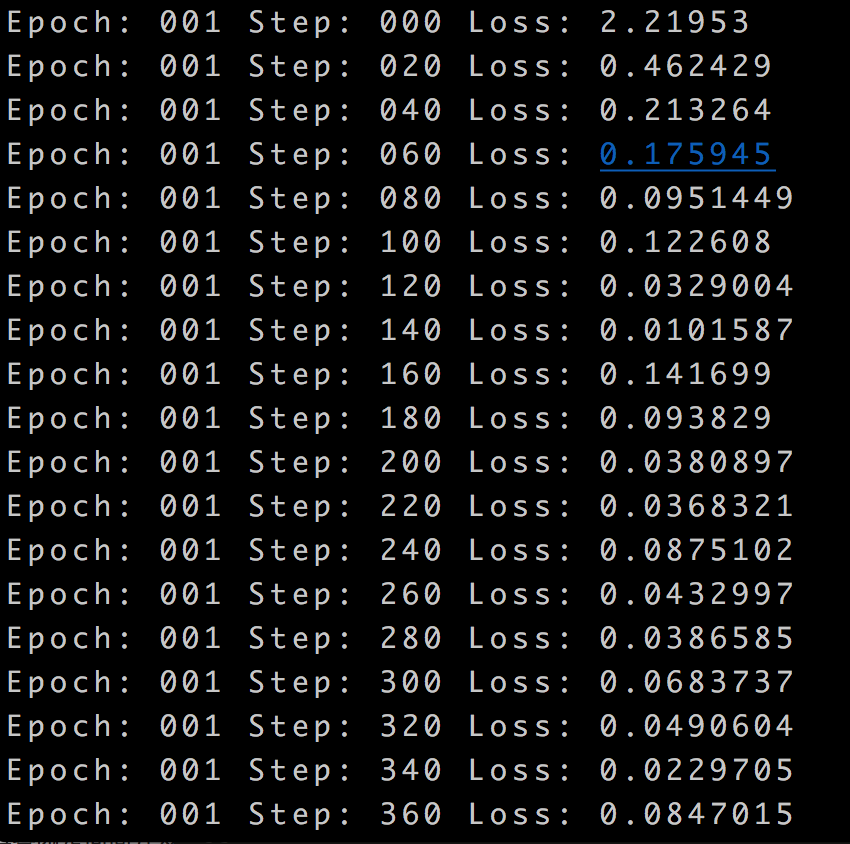TFLearn 与 Tensorflow 一起使用
好用的不是一点点、、=-=、、
import tensorflow as tf
import tflearn
import tflearn.datasets.mnist as mnist
# Using MNIST Dataset
import tflearn.datasets.mnist as mnist
mnist_data = mnist.read_data_sets(one_hot=True)
# User defined placeholders
with tf.Graph().as_default():
# Placeholders for data and labels
X = tf.placeholder(shape=(None, 784), dtype=tf.float32)
Y = tf.placeholder(shape=(None, 10), dtype=tf.float32)
net = tf.reshape(X, [-1, 28, 28, 1])
# Using TFLearn wrappers for network building
net = tflearn.conv_2d(net, 32, 3, activation='relu')
net = tflearn.max_pool_2d(net, 2)
net = tflearn.local_response_normalization(net)
net = tflearn.dropout(net, 0.8)
net = tflearn.conv_2d(net, 64, 3, activation='relu')
net = tflearn.max_pool_2d(net, 2)
net = tflearn.local_response_normalization(net)
net = tflearn.dropout(net, 0.8)
net = tflearn.fully_connected(net, 128, activation='tanh')
net = tflearn.dropout(net, 0.8)
net = tflearn.fully_connected(net, 256, activation='tanh')
net = tflearn.dropout(net, 0.8)
net = tflearn.fully_connected(net, 10, activation='linear')
# Defining other ops using Tensorflow
loss = tf.reduce_mean(tf.nn.softmax_cross_entropy_with_logits(logits=net, labels=Y))
optimizer = tf.train.AdamOptimizer(learning_rate=0.01).minimize(loss)
# Initializing the variables
init = tf.initialize_all_variables()
# Launch the graph
with tf.Session() as sess:
sess.run(init)
batch_size = 128
for epoch in range(2): # 2 epochs
avg_cost = 0.
total_batch = int(mnist_data.train.num_examples/batch_size)
for i in range(total_batch):
batch_xs, batch_ys = mnist_data.train.next_batch(batch_size)
sess.run(optimizer, feed_dict={X: batch_xs, Y: batch_ys})
cost = sess.run(loss, feed_dict={X: batch_xs, Y: batch_ys})
avg_cost += cost/total_batch
if i % 20 == 0:
print "Epoch:", '%03d' % (epoch+1), "Step:", '%03d' % i, "Loss:", str(cost)
结果:

TFLearn 与 Tensorflow 一起使用的更多相关文章
- NN tutorials:
确实“人话”解释清楚了 ^_^ 池化不只有减少参数的作用,还可以: 不变性,更关注是否存在某些特征而不是特征具体的位置.可以看作加了一个很强的先验,让学到的特征要能容忍一些的变化.防止过拟合,提高模型 ...
- Tensorflow tflearn 编写RCNN
两周多的努力总算写出了RCNN的代码,这段代码非常有意思,并且还顺带复习了几个Tensorflow应用方面的知识点,故特此总结下,带大家分享下经验.理论方面,RCNN的理论教程颇多,这里我不在做详尽说 ...
- tflearn tensorflow LSTM predict sin function
from __future__ import division, print_function, absolute_import import tflearn import numpy as np i ...
- TensorFlow 之 高层封装slim,tflearn,keras
tensorflow资源整合 使用原生态TensorFlow API来实现各种不同的神经网络结构.虽然原生态的TensorFlow API可以很灵活的支持不同的神经网络结构,但是其代码相对比较冗长,写 ...
- tflearn 中文汉字识别,训练后模型存为pb给TensorFlow使用——模型层次太深,或者太复杂训练时候都不会收敛
tflearn 中文汉字识别,训练后模型存为pb给TensorFlow使用. 数据目录在data,data下放了汉字识别图片: data$ ls0 1 10 11 12 13 14 15 ...
- anaconda tensorflow tflearn 自动安装脚本 anaconda使用-b可以非交互式安装
install_dir=/usr/local/anaconda3 DIR="$( cd "$( dirname "${BASH_SOURCE[0]}" )&qu ...
- 将tflearn的模型保存为pb,给TensorFlow使用
参考:https://github.com/tflearn/tflearn/issues/964 解决方法: """ Tensorflow graph freezer C ...
- TensorFlow实战笔记(17)---TFlearn
目录: 分布式Estimator 自定义模型 建立自己的机器学习Estimator 调节RunConfig运行时的参数 Experiment和LearnRunner 深度学习Estimator 深度神 ...
- 吴裕雄--天生自然TensorFlow高层封装:使用TFLearn处理MNIST数据集实现LeNet-5模型
# 1. 通过TFLearn的API定义卷机神经网络. import tflearn import tflearn.datasets.mnist as mnist from tflearn.layer ...
随机推荐
- snort安装使用教程(CentOS6.5)
官网:https://www.snort.org/ 官方文档:https://www.snort.org/documents 2.安装 2.1安装依赖 yum install flex bison - ...
- Linux升级内核教程(CentOS7)
1.查看当前内核版本 uname -r 2.通过yum升级内核 通过yum升级内核是最保险的升级方式,因为安装的是操作系统发行厂商验证过兼容性的rpm包,升级风险一般很小. yum install - ...
- CM+CDH安装教程(CentOS)
一.简单介绍 CM:Cloudera Manager,Cloudera公司编写的一个CDH的管理后台,类似各CMS的管理后台. CDH:Cloudera’s distribution,includin ...
- Oracle 如何循环查询结果集,进行新增或修改
Oracle的PL/SQL中怎样循环查询的结果集,然后根据查询结果进行判断,是新增或修改操作 loop循环例子 for item in (select a,b,c from table_a where ...
- lombok @Slf4j注解
背景知道有这么个东西,是因为项目中用到了@Slf4j注解. lombok库提供了一些注解来简化java代码 官网:http://projectlombok.org/ 查看lombok所有api:htt ...
- 异步socket处理
服务器端: #include <boost/thread.hpp> #include <boost/asio.hpp> #include <boost/date_time ...
- POJ 2243 Knight Moves(BFS)
POJ 2243 Knight Moves A friend of you is doing research on the Traveling Knight Problem (TKP) where ...
- SpringMVC中文乱码的解决办法
中文乱码分类: (1)按照请求分类: GET请求乱码 POST请求乱码 (2)按照乱码位置分类 从前台传到后台的数据乱码(存储到数据库中的数据乱码) 从后台传到前台的数据乱码(显示在页面的数据乱码) ...
- IIS设置上传文件大小限制
单位为字节. 500*1024*1024=524288000
- jdk8-stream的api
1.stream流的概念 1.流的创建 //1. 创建 Stream @Test public void test1(){ //1. Collection 提供了两个方法 stream() 与 par ...
